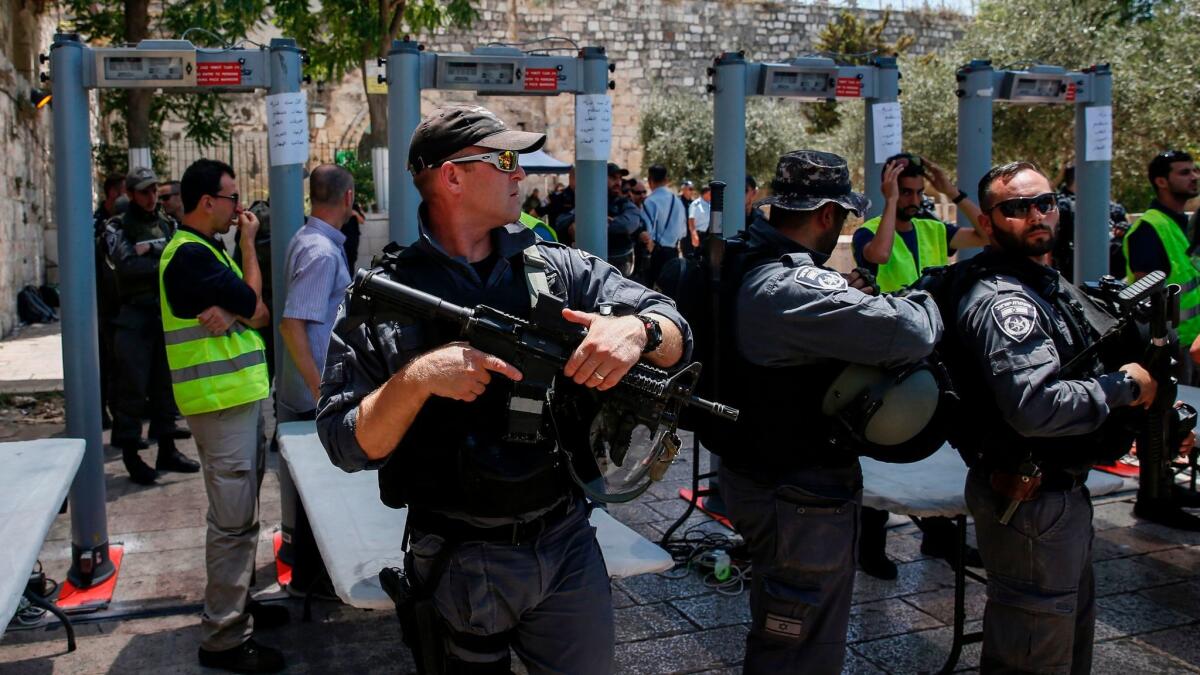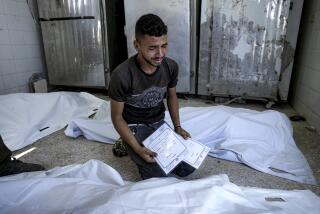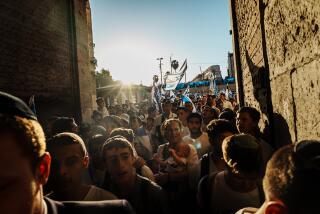Israel reopens Muslim holy site — but the addition of metal detectors sparks new protests

- Share via
Reporting from Tel Aviv — Israel reopened the Temple Mount plaza outside Al Aqsa Mosque on Sunday for the first time since a deadly shootout at the Jerusalem holy site two days earlier, but tensions persisted as Palestinians protested the new metal detectors placed at the entrance to the compound.
The Old City plaza, revered by Jews and Muslims, was shuttered to worshipers and tourists alike after three Israeli Arabs used improvised machine guns to kill two Israeli Druze policemen on Friday morning and then were killed by police. Israeli authorities said the use of live weapons in an attack on security forces at the holy site was “unprecedented.’’
The reopening of the esplanade should have defused emotions after Friday prayers were canceled for the first time in decades. But the new equipment fanned criticism and protests that Israel had unilaterally changed the rules regarding religious worship and tourist visits at the complex.
Israel said that the metal detectors — set up outside the Old City’s Lions Gate and the Majlis Gate — were a part of tightened security measures in Jerusalem’s Old City after the attack. In addition, police will install cameras outside the esplanade to monitor the compound.
Palestinian Authority and religious officials held an emergency meeting in Ramallah to discuss the security measures, and called on Arab and Muslim nations to intervene against the Israeli moves.
A Palestinian government statement called the security measures “null and void” and “a violation of the sanctity of the Al Aqsa Mosque.”
Officials from the Muslim Waqf, the authority that runs the holy site, urged followers to remain outside the compound in protest rather than pass through the metal detectors.
Dozens of worshipers held midday prayers just feet away from the metal detectors, which were operated by Israeli border police in riot gear. In the evening, brief scuffles broke out between police and demonstrators gathered at the metal detectors.
“The Israelis have imposed severe security restrictions on the Muslim worshipers,’’ said Omar Kiswani, the director of Al Aqsa Mosque. “We urge them to pray outside the gates of the mosque until the Israeli authority removes all the security measures and things will go back to normal.”
Israeli authorities said that several hundred Muslim worshipers nonetheless entered the compound — though it was significantly fewer than the usual number of visitors.
“The Waqf is trying to instigate worshipers to refuse to pass through the gates and the metal detectors,’’ said Israeli Public Security Minister Gilad Erdan.
The plaza is holy to Jews as the site of their ancient temple, while Muslims revere it as the site where the prophet Muhammad is said to have risen to heaven.
At the Western Wall plaza below the compound, worshipers and tourists have been subjected to metal detector checks for years.
Violent clashes on the Temple Mount — called the Noble Sanctuary by Muslims — have been the spark for prolonged and deadly waves of Israeli-Palestinian violence in the past: rioting on the plaza that broke out in 2000 after the visit of Israel’s Ariel Sharon to the site sparked a several-year uprising dubbed Al Aqsa Intifada.
The newly inflamed tensions around the holy site have spurred jitters in the region about fresh violence.
In a statement Saturday, the U.S. defended Israel’s closing of the holy site to investigate the attack, and urged leaders in the region to be “understanding” of the move.
French President Emmanuel Macron, who met with Israeli Prime Minister Benjamin Netanyahu in Paris on Sunday, condemned the “odious” attack and called for a resumption of negotiations aimed at a so-called two-state solution for peace between Israelis and Palestinians.
Jordan’s King Abdullah II, who is the official custodian of Jerusalem’s Muslim holy sites under the country’s peace treaty with Israel, held a phone conversation Saturday with Netanyahu. Abdullah said there was a need for “de-escalation” at the holy site and “rejected” the closure, according to Jordan state news agency Petra.
During a phone call Friday, Israel’s prime minister told Palestinian Authority President Mahmoud Abbas that Israel had no intention of changing the religious status quo at the site.
But Ir Amim, an Israeli peace organization that monitors Jerusalem, said the metal detectors and security checks “impose Israeli sovereignty in violation of arrangements established and respected” since Israel captured the Old City in the 1967 Six-Day War.
ALSO
He’s Jewish, she’s Muslim, and they may be heading toward a showdown over Jerusalem’s holiest site
Israelis and Palestinians agree to water deal to help communities suffering chronic shortages
Warriors, dreamers and just plain crazy: U.S. civilian volunteers fighting Islamic State in Syria
Mitnick is a special correspondent. Times staff writer Alexandra Zavis in Los Angeles contributed to this report.
Twitter: @joshmitnick
More to Read
Sign up for Essential California
The most important California stories and recommendations in your inbox every morning.
You may occasionally receive promotional content from the Los Angeles Times.










